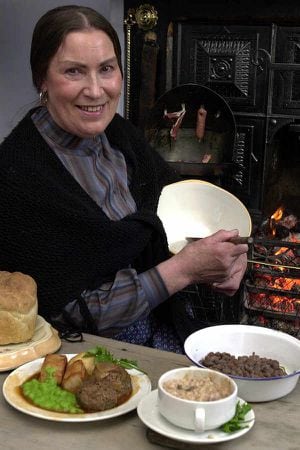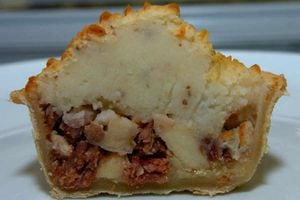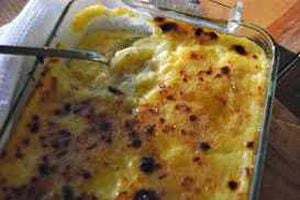Celebrating traditional food in the Black Country and Shropshire
The West Midlands and Shropshire has a fantastic wealth of recipes from the past. Here are a few local foods which are unique to our patch, why not try and make a few yourself?

Pork scratchings

Nowadays pork scratchings are undergoing something of a revival. The tasty nibble is moving away from its historical patronage as a "Black Country pub snack" and is fast becoming a highly desirable product in bars, restaurants and gastropubs. It is still one to enjoy with a refreshing, local pint.
Shrewsbury cakes
Traditionally, Shrewsbury cakes were baked as thick, large biscuits, able to be kept for long periods of time. The cakes are renowned for their texture, being crisp and brittle, and were given to people of importance when they visited Shrewsbury. There is a significant variation in recipes, but generally speaking a Shrewsbury cake is a large, round shortbread with rose flavouring.
It is said Shrewsbury cakes were first produced by a Mr Pailin (or Palin, or Hailin) - a plaque on an old shop near to Shrewsbury Castle reads: "This shop occupies the site of a building where Palin first made the unique Shrewsbury cakes to his original recipe in the year 1760".

Faggots (aka 'savoury ducks')
Faggots are an old-fashioned British food commonly associated with Birmingham and the Midlands. However, faggots have enjoyed a recent revival and are now eaten all over the UK.
Traditionally they are made from offal, usually pork, and from the bits of the animal that are generally discarded such as the heart and the liver. This makes faggots a cheap and nutritious dish. They are traditionally eaten with mushy peas, mashed potatoes and onion gravy. Faggots are also known as "ducks" in the Midlands, and were most popular during rationing in World War II. And if we haven't put you off with what's in them, why not close your eyes and give them a try (they aren't too pretty to look at). You never know, you might actually like them.
The Balti Triangle in Birmingham
The balti was brought to Birmingham in the mid 1970s by the city's large Pakistani and Kashmiri communities. It rapidly became established as a favourite dish, both within and outside the Asian community. In response to popular demand, more and more restaurants began offering the delicious combination of fresh meat and vegetables with sizzling spices. There are approximately 50 restaurants and takeaways in the triangle which covers the area of balti houses clustered along Ladypool Road, Stoney Lane and Stratford Road, to the south of Birmingham's city centre
The naan is as much a feature of balti houses as the bowls and perfect for dipping into your curry. In fact, Birmingham's balti houses are renowned for giant naans made for sharing, which practically cover the table!
Staffordshire Oatcakes
One of the more unlikely 'local heroes', the Staffordshire oatcake has kept a bit of a low profile. Oatcakes are a delicacy which have reportedly been around for hundreds of years. Making them is an inherited tradition that still flourishes today, but the oatcakes' history is much debated and many people have their own stories to tell about its origins.
You wouldn't exactly call it a 'looker' in the food stakes. In fact, it looks and feels a bit like a dirty flannel, but its taste really does contradict its looks. Staffordshire is famous for its pottery, and oatcakes are the original potter's fast food. They're affectionately known locally as a 'Pottery's Poppadom', a ''Tunstall Tortilla', and a 'Clay Suzette', especially in the words of the late local poet Arthur Berry. Why not try them with a bit of bacon, cheese and sauce or maybe just a spot of homemade jam?

Probably Shropshire's best-known dish, Fidget Pie was in danger of becoming a distant memory. Only the elderly still had recipes or remembered its function as a portable meal for men working in the fields. However, when TV chefs the Hairy Bikers visited Ludlow in 2009, they helped to revive the Fidget Pie, made from a combination of ham, apples, onions, cider and cheese.
No one knows exactly when the pie was invented, but it has been made for at least 400 years. The name probably comes from the fact that it was originally 'fitched' or five-sided in shape, although there's also the less appetising theory that it stems from 'fitchett' or 'fitch' - the name locals used for a polecat - due to the fact that the pie smelled foul during baking.

Malvern Pudding
Malvern pudding is a traditional pudding from Malvern in Worcestershire. It is a baked dish made with apples or other seasonal fruit and custard although variations exist. Rich in butter and sugar it is highly calorific, but very tasty and simple to make. The creamy taste of the pudding is characterised by apples - for which Worcestershire is famous- and spices, normally cinnamon, which enhance the taste.
Shropshire Soul Cakes
Another tasty tradition from Shropshire are Soul Cakes, although sadly these have now mostly disappeared. On All Souls' Day on the 2nd of November each year, the dead were remembered and children would go 'a-souling', where they would sing a short song and receive a cake marked with a cross.
A little like hot-cross buns, the cakes were usually filled with allspice, nutmeg, cinnamon, ginger or other sweet spices, raisins or currants, and before baking they were topped with the mark of a cross. Each cake eaten would represent a soul being freed from Purgatory. The practice of giving and eating soul cakes is often seen as the origin of modern trick-or-treating.
Other traditional foods from the Black Country and Shropshire include Warwickshire Stew, made from cheap cuts of beef, and pig's trotters - valuable as they lasted longer with bigger families for a smaller price. Apples, pears and damsons were, and still are, very popular - great for puddings, jams, ciders or on their own with a slosh of cream.
By Jody Ball





